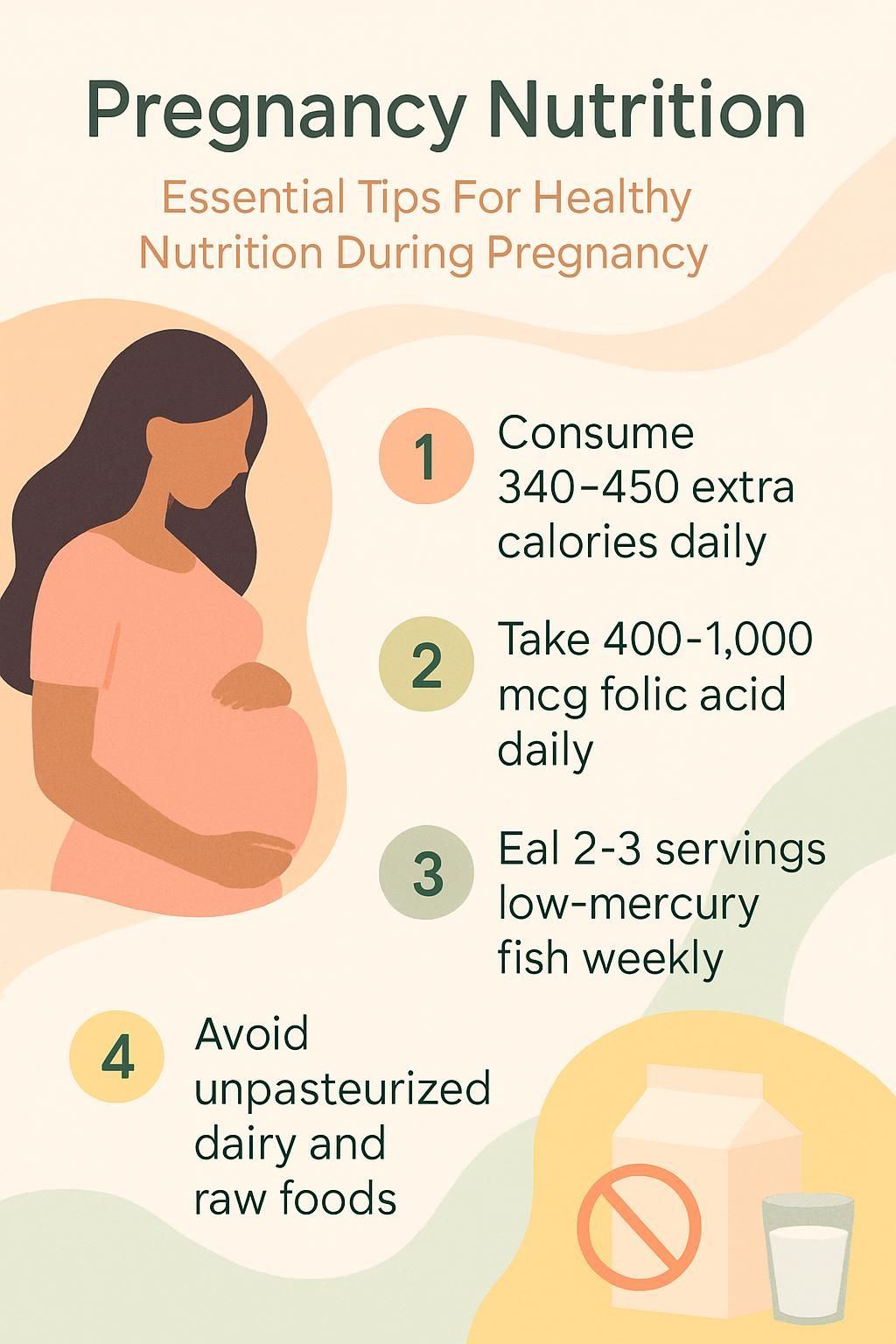Pregnancy Nutrition: Essential Tips For Healthy Nutrition During Pregnancy
Our Nutrition Assistant AI Suite will transform your body. You will lose fat, get toned, and build muscle. Gain confidence and optimal health.
Sorting pregnancy advice can feel overwhelming. Clear, steady steps make it easier. Good nutrition during pregnancy powers your energy, supports your baby’s growth, and helps you feel your best each day.
In most cases you will need some extra calories, starting in the second trimester, to fuel healthy development. This guide explains nutrition during pregnancy in plain language. You will learn what to eat, which supplements to consider, and how to handle food safely. Use these tips to build simple habits that stick.
Key Takeaways
- From the second trimester, add about 340 to 450 calories per day, and focus on nutrient-dense choices from all food groups, based on USDA MyPlate guidance.
- Core nutrients include folic acid, 400 to 1,000 micrograms daily, iron 27 mg, calcium 1,000 mg, vitamin D 600 IU, and choline 450 mg.
- Eat two or three servings of low-mercury seafood each week for omega-3s. Avoid king mackerel and bigeye tuna due to high mercury.
- Skip unpasteurized dairy and any raw or undercooked meat, eggs, or seafood because of Listeria and Salmonella risks.
- Take only one prenatal supplement daily as directed by your OB-GYN. Do not exceed vitamin A limits, which can raise the risk of birth defects.

Why Nutrition Is Crucial During Pregnancy

Food is building material for two bodies. A balanced plate gives you steady energy and gives your baby the nutrients required for healthy growth.
How Does Nutrition Affect Fetal Growth and Development?
Nutrients such as folic acid, iron, calcium, vitamin D, and omega-3 fats shape early development. Folic acid helps prevent neural tube defects, which affect the brain and spine and form in the first month after conception.
Most experts advise at least 400 micrograms of folic acid per day. Iron supports hemoglobin, the protein that moves oxygen. Low iron raises the chance of preterm birth and low birth weight.
Protein is the body’s construction crew. Aim for about 71 grams per day to build muscles, organs, and the placenta. Omega-3 fats from salmon or flaxseed support the brain and nervous system.
A mix of whole grains, beans, dairy, fruits, and vegetables lays the foundation for strong bones, teeth, and blood cells. These habits can also set you up for smoother breastfeeding later.
How Does Nutrition Benefit Maternal Health?
As your blood volume expands, your iron needs double compared to before pregnancy. Iron helps prevent anemia, which can cause fatigue and headaches. Calcium-rich foods support your bones and teeth as your baby’s skeleton forms.
Adults need 1,000 mg of calcium per day and teens need 1,300 mg. Drink 8 to 12 cups of water daily to ease swelling and constipation. Vitamin D, 600 IU per day, helps you absorb calcium from foods like milk and fortified cereal.
Taking care of yourself is one way you take care of your baby.
How Can Proper Nutrition Prevent Pregnancy Complications?
Solid nutrition can lower the risk of complications. Folic acid can reduce neural tube defects by as much as 70 percent. Iron supports a healthy blood supply and eases fatigue.
Healthy weight gain reduces the risk of gestational diabetes, high blood pressure, and preeclampsia. Getting enough calcium may also help with blood pressure control.
Build meals with vegetables, fruits, whole grains, dairy, lean meats, soy products, and beans or peas. This variety covers your bases and supports both you and your baby.
Essential Nutrients for Pregnancy
Your nutrition needs rise during pregnancy. The right vitamins and minerals support healthy development and lower the chance of some birth defects.
What Is the Role of Folic Acid in Pregnancy?
Folic acid is a B vitamin that helps form the neural tube, which becomes the brain and spinal cord. Most adults who could become pregnant should get 400 micrograms daily, then 600 to 1,000 micrograms during pregnancy.
Food sources include fortified breakfast cereal, spinach, other leafy greens, citrus fruits, beans, and peas. Some people with a family history of neural tube defects may need up to 4 milligrams a day before and through early pregnancy, under medical guidance.
Enough folic acid before and during early pregnancy protects against major birth defects of the brain and spine.
Tracking intake with a diet app or the MyPlate plan can help you stay on target.
Why Is Iron Important During Pregnancy?
Iron helps your body make hemoglobin. Your needs rise to 27 mg per day during pregnancy because your blood volume increases and your baby relies on your supply.
Shortfalls can cause anemia and may raise risks for preterm birth and low birth weight. Good sources include iron-fortified oats, lean beef, spinach, kidney beans, and dark turkey meat. Pair plant sources with vitamin C, like oranges or strawberries, to increase absorption.
Avoid drinking high-calcium beverages at the same time as iron-rich meals because calcium can slow iron absorption.
How Does Calcium Support Bones and Teeth in Pregnancy?
Calcium helps build your baby’s bones and teeth while also protecting your own. Most adults need 1,000 mg daily and teens need 1,300 mg.
Skim milk, low-fat yogurt, part-skim mozzarella, and canned salmon with bones are strong sources. Fortified juices and leafy greens can help if dairy does not sit well. Calcium supplements can fill gaps when needed.
Choose a mix of foods, then add a supplement only if your intake runs short.
How Does Vitamin D Promote Bone Health for Mom and Baby?
Vitamin D helps your gut absorb calcium. Aim for 600 IU daily during pregnancy, based on advice from the Academy of Nutrition and Dietetics.
Sources include cooked sockeye salmon, fortified milk, fortified orange juice, and eggs. A simple shift, like adding salmon once a week, can raise your intake and support bone health for you and your baby.
How Do Omega-3 Fatty Acids Help Brain Development?
Omega-3 fats, especially DHA, support your baby’s brain and eye development. Eat 2 to 3 servings per week of low-mercury fish, such as salmon, sardines, or trout. One serving is about 4 ounces.
Avoid king mackerel and bigeye tuna. Limit albacore tuna to 6 ounces per week. Plant sources such as walnuts and flaxseed also help. Ask your healthcare provider about DHA supplements if you do not eat fish.
What Role Does Protein Play in Tissue Growth During Pregnancy?
Protein builds tissues for both you and your baby. It supports the placenta, growing organs, and your expanding blood volume. The target for most pregnant adults is about 71 grams each day.
Try cottage cheese, chicken, salmon, eggs, soy, beans, lentils, or milk. Mixing animal and plant proteins gives you a broader nutrient range and helps meet your daily goal.
How Does Choline Affect Brain and Spinal Cord Development?
Choline helps form acetylcholine, a brain messenger involved in memory and muscle control. It also supports closure of the neural tube during early pregnancy.
Aim for 450 mg per day. Eggs, milk, chicken, beef, soy products, and peanuts are reliable sources. Many prenatal vitamins do not include choline, so plan to get it from food or a separate supplement if your clinician recommends it.
How Can Vitamin C Boost Immunity During Pregnancy?
Vitamin C supports immune function and helps your body absorb iron from plant foods. Adults 19 and older need at least 85 mg daily during pregnancy. If you are under 19, aim for 80 mg.
Good sources include oranges, strawberries, tomatoes, and broccoli. Adding a vitamin C food to an iron-rich meal can improve absorption and energy.
Why Are B Vitamins Important for Energy Support?
B vitamins help your body turn food into energy. They also support the placenta and normal vision. Key B vitamins in pregnancy include B1, B2, B6, folate, and B12.
Foods like liver, pork, chicken, bananas, leafy greens, beans, and whole grains supply these nutrients. Many prenatal supplements include B vitamins to help fill gaps.
What Are the Dietary Guidelines for Pregnant Women?
Simple patterns can keep your meals balanced and satisfying. Think colorful produce, whole grains, lean protein, healthy fats, and plenty of fluids.
How Should Pregnant Women Balance Calories and Nutrients?
Focus on quality first, then adjust quantity to meet energy needs. Small, steady changes work best.
- Add about 300 to 450 calories a day starting in the second trimester. Choose whole grains, lean proteins, fruits, and vegetables.
- Fill half your plate with fruits and vegetables at meals to boost vitamins and fiber.
- Include protein daily from beans, eggs, fish with low mercury, poultry, or dairy to support tissue growth.
- Pick whole grains like brown rice and whole-wheat bread for minerals such as magnesium.
- Use MyPlate to keep each food group in the mix. Keep sweets and high-fat treats under 10 percent of daily calories.
- Choose healthy fats from nuts, seeds, avocados, and plant oils. These support your baby’s brain.
- Take only one prenatal vitamin each day as directed. Avoid high-dose vitamin A.
- Limit highly processed foods that are heavy in sodium, which can raise blood pressure.
- Drink water often. Milk or fortified juices can help with nutrients and hydration.
- Track meals in an app or journal to spot gaps and make quick changes.
How Can You Incorporate Various Food Groups in Pregnancy?
Build meals from all five groups. Variety helps you cover your nutrient bases without overthinking every bite.
- Grains: aim for at least half as whole grain, like brown rice or whole-wheat bread.
- Fruits: reach about 2 cups daily, favor whole fruit over juice for fiber.
- Vegetables: include dark greens, orange veggies, beans, and peas. Try for 2.5 to 3 cups per day.
- Protein foods: choose poultry, low-mercury fish, eggs, beans, tofu, and nuts. Rotate options through the week.
- Dairy: pick pasteurized low-fat milk, yogurt, or cheese to support calcium and protein needs.
- Healthy fats: use olive or canola oil, add avocados, nuts, and seeds.
- Fortified foods: use fortified cereals for extra folic acid if your clinician suggests it.
- A simple chart based on MyPlate can help you track daily servings from each group.
Each small choice supports maternal health and steady fetal development.
What Are the Caloric Recommendations for Each Trimester?
Your calorie needs change across pregnancy. They also increase more if you are carrying multiples.
| Trimester | Single Fetus | Twins | Triplets |
|---|---|---|---|
| 1st Trimester (Weeks 1-12) | No extra calories needed | No extra calories needed | No extra calories needed |
| 2nd Trimester (Weeks 13-27) | +340 calories/day | +600 calories/day | +900 calories/day |
| 3rd Trimester (Weeks 28-40) | +450 calories/day | +600 calories/day | +900 calories/day |
- No increase is needed during the first trimester.
- For one baby, add about 340 calories in the second trimester and 450 in the third.
- For twins, add about 600 calories in the second and third trimesters.
- For triplets, aim for about 900 extra calories in the second and third trimesters.
- Choose nutrient-dense foods to meet these targets, not empty calories.
- Small snacks like yogurt or fruit often help you reach goals without feeling too full.
Next, see how healthy fats fit into a balanced plan.
What Is the Role of Healthy Fats in Pregnancy Nutrition?
Healthy fats deliver energy and support brain and eye development. Favor plant oils like olive and canola, plus avocados, nuts, seeds, and low-mercury fish such as salmon and trout.
Limit animal fats found in butter and high-fat meats. Avoid foods with trans fats, often in ultra-processed snacks. Replacing some animal fats with plant oils can support long-term heart health for you and growth for your baby.
What Foods Are Recommended for Pregnancy?
A well-planned plate is simple and satisfying. Whole grains, lean proteins, dairy, fruits, vegetables, and healthy fats give you steady energy and key nutrients.
Why Include Whole Grains and Legumes in Your Diet?
Whole grains like brown rice, oats, and whole-wheat bread supply fiber, B vitamins, iron, and folic acid. Many breakfast cereals are fortified to help you meet your goals.
Legumes, beans, lentils, and peas, add protein, iron, and folate. They are budget-friendly and versatile. Try lentil soup, bean tacos, or chickpea salads to raise fiber and support energy.
What Are Good Protein Sources Like Poultry, Fish, and Eggs?
Lean meats such as beef or pork, poultry, and low-mercury fish provide high-quality protein. Eggs offer protein, choline, and vitamin D to support brain development.
Plant proteins, beans, peas, nuts, and seeds, add fiber and minerals. Cook meats and eggs well to reduce the risk of harmful bacteria.
How Does Dairy Support Pregnancy Nutrition?
Fat-free or low-fat dairy, like yogurt, skim or 1 percent milk, and fortified soy milk supply calcium, potassium, vitamin D, and protein. These nutrients support bone and tooth formation for you and your baby.
Always choose pasteurized dairy to reduce infection risk. Fortified products can add extra vitamin D, which improves calcium absorption.
| Product | Calcium (mg) | Potassium (mg) | Vitamin D (IU) | Protein (g) |
|---|---|---|---|---|
| Skim Milk, 1 cup | 300 | 380 | 100 | 8 |
| Low-Fat Yogurt, 6 oz | 415 | 531 | — | 13 |
| Soy Milk, 1 cup | ~299* | ~287* | up to 120* | ~7* |
*Values vary with brand and fortification.
Pasteurization improves safety so you can meet daily needs without raising your risk for foodborne illness.
Why Are Fruits and Vegetables Important During Pregnancy?
Fruits and vegetables deliver vitamins, minerals, and fiber. Carrots, sweet potatoes, spinach, and tomatoes provide vitamin A and potassium. Bananas, oranges, and grapefruit add potassium and vitamin C.
Fiber helps prevent constipation, which is common during pregnancy. A colorful mix gives you a wide spread of antioxidants that protect cells.
What Are the Benefits of Nuts, Seeds, and Healthy Oils?
Nuts and seeds supply protein, healthy fats, and choline for growth and brain development. Almonds, walnuts, chia seeds, sunflower seeds, and pumpkin seeds are easy snack options.
Plant oils, such as olive or canola, add energy and support heart health. A small handful of mixed nuts can help you meet daily needs without extra supplements.
Which Foods Should Be Avoided During Pregnancy?
Some foods raise the risk of infection or exposure to toxins. Avoiding them helps protect your baby’s development.
Why Avoid High-Mercury Fish When Pregnant?
Mercury from certain fish can cross the placenta and affect brain development. This exposure can harm memory, attention, and learning over time.
Skip bigeye tuna, king mackerel, marlin, orange roughy, shark, swordfish, and tilefish. Limit white or albacore tuna to 6 ounces per week. Check local advisories for wild-caught fish from rivers and lakes.
Source: U.S. Environmental Protection Agency seafood advice on mercury.
What Are the Risks of Unpasteurized Dairy Products?
Unpasteurized milk and soft cheeses such as feta, queso blanco, Camembert, Brie, and blue-veined varieties may carry Listeria. This germ can cause severe illness during pregnancy.
Choose products labeled pasteurized to reduce risk. Listeriosis can lead to miscarriage, preterm birth, or serious newborn illness.
Why Should Raw or Undercooked Foods Be Avoided?
Raw or undercooked seafood, eggs, and meats can contain Listeria, Salmonella, or Toxoplasma. These infections raise the risk of miscarriage or early delivery.
Avoid raw sushi. Cook hot dogs and deli meats until steaming hot. Cook eggs until the yolk and white are firm, and use a thermometer to check safe temperatures for meat and fish.
What Are the Dangers of Caffeine and Alcohol in Pregnancy?
Caffeine crosses the placenta. High intakes may raise the risk of miscarriage, low birth weight, or preterm birth. Keep caffeine under 200 milligrams per day, which is about a 12-ounce cup of coffee.
Alcohol is unsafe at any time in pregnancy. It can cause fetal alcohol spectrum disorders, which include physical and learning problems. Avoid all alcoholic drinks if you are pregnant or trying to conceive.
How Do Processed Foods and Sodium Affect Pregnancy?
Processed foods are often high in sodium, additives, and unhealthy fats. Too much sodium can increase blood pressure and the risk of preeclampsia.
Try to keep sodium under 2,300 milligrams per day. Replace packaged snacks and salty meals with fresh options, such as fruit, vegetables, and whole foods.
What Are the Guidelines for Safe Food Handling During Pregnancy?
Safe food handling lowers your risk of foodborne illness. These habits protect both you and your baby.
How to Properly Wash Fruits and Vegetables?
Rinsing produce removes dirt, germs, and pesticide residue. Make it part of your routine before you prep meals or snacks.
- Rinse all produce under running water before eating, cutting, or cooking, even items you plan to peel.
- Wash your hands with soap and water before handling food.
- Rub produce gently under running water. Do not use soap or bleach.
- Scrub firm items like carrots or potatoes with a clean brush.
- Dry with a clean cloth or paper towel.
- Cut away bruised or damaged areas.
- Store washed produce in clean containers.
How Can You Prevent Cross-Contamination in the Kitchen?
Cross-contamination spreads bacteria from one food to another. Keep raw foods separate from ready-to-eat items.
- Wash hands before, during, and after handling raw meat, seafood, eggs, or produce.
- Use separate cutting boards for raw proteins and ready-to-eat foods.
- Clean knives and utensils with hot soapy water after touching raw foods.
- Sanitize counters after meal prep.
- Store raw meats on the lowest shelf in the fridge.
- Use clean towels or paper towels for spills. Replace sponges often.
What Are Safe Food Storage and Cooking Practices?
Using the right temperatures and storage times helps prevent bacterial growth.
- Cook poultry to 165°F, ground meats to 160°F, and fish to 145°F. Use a food thermometer.
- Refrigerate perishable foods within two hours of cooking or purchase.
- Store raw meats away from fruits and vegetables.
- Wash hands before handling foods, especially after touching raw meat or eggs.
- Clean cutting boards and utensils between tasks.
- Avoid unpasteurized milk products.
- Use airtight containers for nutrient-rich foods to preserve quality.
- Thaw frozen meats in the refrigerator, not on the counter.
- Discard foods left out at room temperature for more than two hours.
- Check expiration dates before eating packaged items.
Why Are Prenatal Vitamins Important?
Prenatal vitamins and mineral supplements fill common gaps, such as folic acid, iron, vitamin D, and iodine. They support your baby’s development and your health.
When Should Supplements Be Taken During Pregnancy?
Most clinicians advise starting folic acid at least one month before you try to conceive, then continuing through the first trimester. Keep taking a prenatal vitamin throughout pregnancy unless your provider advises a different plan.
Taking iron with water and a vitamin C food may improve absorption. Follow timing and dosage on the label or as directed by your healthcare provider.
How to Choose the Right Prenatal Vitamins?
Choose a prenatal that includes at least 400 micrograms of folic acid, 27 mg of iron, and about 1,000 mg of calcium. Look for 600 IU of vitamin D as well.
Some people need extra folic acid due to family history or certain medications. Ask your clinician if you need choline or omega-3s in a separate supplement.
Why Consult Healthcare Providers About Prenatal Supplements?
Your healthcare provider can tailor your plan based on diet, lab results, and medical history. They can also warn you about unsafe or unnecessary products, including some herbal supplements.
Blood work may show you need extra iron, vitamin D, or B12. A quick check-in can improve energy and support a safer pregnancy.
How to Manage Weight Gain During Pregnancy?
Healthy weight gain supports your baby’s growth and helps you feel better. The right range depends on your starting BMI.
What Are Weight Gain Recommendations Based on BMI?
Use these ranges as a guide. Your care team can personalize targets based on your health and pregnancy.
| Pre-Pregnancy BMI | Recommended Total Weight Gain (Singleton) | Recommended Weekly Gain (2nd & 3rd Trimester) | Recommended Total Weight Gain (Twins) |
|---|---|---|---|
| Underweight (BMI <18.5) | 28–40 lbs | 1.0–1.3 lbs/week | Not specified |
| Normal Weight (BMI 18.5–24.9) | 25–35 lbs | 0.8–1.0 lbs/week | 37–54 lbs |
| Overweight (BMI 25.0–29.9) | 15–25 lbs | 0.5–0.7 lbs/week | 31–50 lbs |
| Obese (BMI 30.0+) | 11–20 lbs | 0.4–0.6 lbs/week | 25–42 lbs |
Tracking weekly trends can help you and your provider spot issues early and adjust your plan.
What Strategies Help Manage Healthy Weight Gain?
Steady routines help most. Plan meals, build balanced plates, and check in with your care team.
- Use MyPlate to guide portions from each food group. Add vitamin C foods, such as oranges, to help with iron absorption.
- Expect little or no gain in the first trimester. Then aim for about 0.5 to 1 pound per week with a normal BMI.
- Eat every three to four hours to avoid energy dips and overeating later.
- Work with your OB-GYN or a registered dietitian for a personalized plan.
- Choose whole grains, lean protein, dairy, vegetables, fruits, nuts, and seeds.
- Drink water throughout the day to support digestion and reduce excess snacking.
- Keep healthy snacks on hand, like yogurt with fruit or trail mix.
- Use smaller plates to help with portions. Pause mid-meal to check your hunger.
- Log weekly changes and discuss them at prenatal visits.
Why Is Hydration Important During Pregnancy?
Your body uses more water to support extra blood volume and amniotic fluid. Adequate fluids also help with digestion and nutrient transport.
How Can You Stay Properly Hydrated?
Fluid needs go up during pregnancy. Small, frequent sips often beat large infrequent drinks.
- Aim for 8 to 12 cups of fluids daily unless your provider suggests otherwise.
- Choose water most often. Add milk or small servings of 100 percent fruit juice for variety.
- Check urine color. Pale yellow usually signals good hydration.
- Carry a refillable bottle. Sip more during hot weather or activity.
- Eat hydrating foods like oranges, watermelon, cucumbers, and soups.
- Limit caffeinated drinks, which can increase urination.
- Set phone reminders if you struggle to drink enough.
- If you have nausea, take small sips often.
- Pair a glass of water with each meal and snack.
- Chilled juice or flavored water can be easier to tolerate during morning sickness.
What Is the Recommended Water Intake for Pregnant Women?
Most pregnant adults need 8 to 12 cups of water daily. Water supports blood volume, amniotic fluid, and digestion. It also helps prevent constipation and urinary tract infections.
Plain water is best. Hydrating foods and beverages can help you reach your goal. Clear or light-colored urine is a simple check that you are on track.
Which Healthy Beverages Are Safe to Drink?
Water is the top choice. Pasteurized milk provides calcium and vitamin D. Limit 100 percent fruit juice to small servings because it can be high in sugar.
Avoid alcohol. Talk with your healthcare provider about caffeine and artificial sweeteners. Herbal teas without caffeine and unsweetened sparkling water are reasonable options.
Conclusion
Healthy eating during pregnancy is a daily practice, not a perfect scorecard. Build meals with whole grains, lean protein, fruits, vegetables, dairy, and healthy fats. Prioritize folic acid, iron, calcium, choline, vitamin D, omega-3s, vitamin C, and B vitamins. This supports your health and your baby’s growth.
Stay hydrated, follow safe food handling, and use a prenatal vitamin if your provider recommends it. For any questions or special needs, including vegetarian diets or conditions like anemia, talk with your healthcare provider. This guide is educational and does not replace medical care.
References: USDA MyPlate, American College of Obstetricians and Gynecologists, U.S. Food and Drug Administration, Centers for Disease Control and Prevention, U.S. Environmental Protection Agency.
FAQs
1. Why is orange (fruit) important for pregnancy nutrition?
Orange (fruit) provides vitamin C, folate, and hydration. These nutrients support the immune system and help fetal growth during pregnancy. Studies show that vitamin C helps absorb iron from plant foods, which can lower the risk of anemia in pregnant women.
2. How much orange (fruit) should a pregnant woman eat each day?
Experts recommend one to two servings of fruit daily during pregnancy; one medium-sized orange counts as a serving. Each orange contains about 70 mg of vitamin C and 40 micrograms of folate according to USDA data.
3. Can eating too many oranges cause problems during pregnancy?
Eating several oranges per day may lead to excess sugar intake or stomach upset due to their acidity. Moderation is key; most research supports enjoying oranges as part of a balanced diet with other fruits and vegetables.
4. What are some easy ways to include more orange (fruit) in a pregnancy diet?
Add sliced orange segments to salads or yogurt, drink fresh-squeezed juice without added sugar, or use zest for flavoring dishes. In my experience working with expectant mothers, these simple changes made it easier for them to meet daily nutrient needs while keeping meals enjoyable.
Summary: Orange (fruit) offers vital nutrients like vitamin C and folate that benefit both mother and baby during pregnancy. Eating moderate amounts fits well within evidence-based guidelines for healthy prenatal nutrition.







